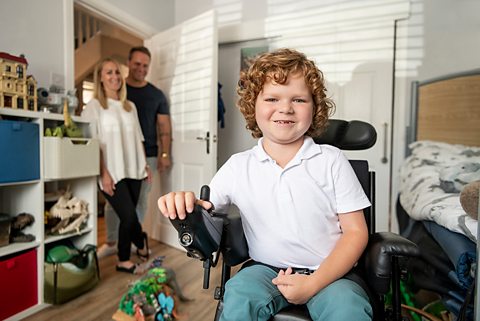Sign up to the BBC Bitesize newsletter! External LinkSign up to the BBC Bitesize newsletter!
For home education news and stories plus updates on the latest Bitesize content, register for our newsletter today.

How do I apply for funding for home education in the UK?
If you’re considering home educating your child, you may want to think about the financial implications and how you’ll pay for it. Once you’ve deregistered your child from a state school, you assume financial responsibility for their education. Local authorities don’t tend to fund home education (since a state school place, or state-funded place, is available for the child) unless there are specific circumstances relating to your child’s Special Educational Needs and Disabilities (SEND).

How much does it cost to home educate a child in the UK?
If you choose to home educate your child, you’ll need to cover expenses like:
- books, equipment and subscriptions
- tutoring costs
- examination costs
- trips and excursions
- sports and activities
- increased utility bills, if you’re at home more often
- the cost of your time, especially if a parent is reducing their working hours
What home education grants are there in the UK?
There are no government grants for elective home education (‘EHE’ in England, Wales and Northern Ireland and ‘home education’ in Scotland), but there are avenues you can look into to help you out with finances:
- benefits, such as child benefit
- local authority (LA) funding if your child has an Education and Health Care Plan (EHCP)
- LA support with exam fees
- financial hardship grants
- charity support
- discounts from local businesses
- sharing education and tutoring costs with other parents
- online fundraising platforms
How does home education affect my benefits?
If you receive child benefit and decide to home educate your child, this won’t affect your eligibility. EHE doesn’t alter your entitlement to Universal Credit, but you will need to continue to search for employment, and let the Department for Work and Pensions (DWP) know what hours you’re available to work and/or do things like job interviews. You can speak to your local job centre or go online to gov.uk to find out more.
How to apply for SEND funding for home education
If your child has an EHCP and you’ve chosen to home educate them yourself, the LA will likely not fund your child’s education, especially if they’ve offered you a school place or other setting they feel is appropriate. However, it’s worth contacting your LA to discuss your child’s individual situation. If your LA has decided your child is better off receiving Education Otherwise Than At School (EOTAS), which is essentially education outside the school setting, they’ll pay for that for you. (See below for details.)
You can still claim Disability Living Allowance (DLA - Child Disability Payment in Scotland) if your child is under 16, has a disability and you’re home educating them. You’re also still eligible for a grant via the Family Fund if you’re on a low income and have a disabled or seriously ill child.
The charity WellChild has a list of charities which offer grants to parents of disabled children. While many of the grants will focus on equipment such as wheelchairs and hoists, you may also be able to apply for specialist equipment like a computer and assistive technology for your child.

What funding is there for Education Otherwise Than At School (EOTAS)?
Your LA is responsible for funding your child’s EOTAS because they’re the ones who make the decision if they feel a school setting can’t meet your child’s needs. This includes funding EHE if they agree it’s the best route for the child.
This funding is usually referred to as a personal budget and will be based on the specific provision outlined in your child’s EHCP. According to Knowsley Council, in North West England: “The funding amount is decided on a case-by-case basis, determined by the provision in the EHCP. This is different from EHE as the local authority remains responsible for ensuring that the provision in the EHCP is delivered.”
Your child’s EHCP will be reviewed by your local authority annually, regardless of where their education is taking place.
Are there any other grants for home educating?
Charity Turn2us has information on grants and benefits if you’re bringing up children and facing financial hardship. These grants are not specifically aimed at parents who are home educating, but you may still be eligible if you’re experiencing financial insecurity. If you’re struggling to pay for bills and essential items, you may be eligible for the Household Support Fund via your local council.
Some local authorities will pay examination fees, although it’s up to you and your child if they’re going to sit any exams. Most LA websites have a section dedicated to home education, with a phone number or an email address so you can contact them to find out more.
The starting price for entering your child as a private candidate for GCSEs is around £50 per exam for maths and English, but the amount will also depend on where they’re going to sit the exam: for example in a special examination centre, which may cost more. Some home educating parents also opt for IGCSEs (International General Certificate of Secondary Education) because they don’t require any coursework or practical exams at home.
Some colleges offer funded places to 14-16-year-olds who’ve been home educated. You’ll need to apply for a place, but fees are paid for by the Education and Skills Funding Agency (ESFA).
What other ways can I get financial support with home education?
There are various methods you could try:
Sharing tutoring costs and resources with other parents can save money and create a social network of support. You can find local home education groups on social media.
Charities such as Education Otherwise and Home Education Advisory Service, and home education websites, have advice and support as well as discounts with certain education resource providers.
James Dyson Foundation offers homeschooling resources linked to design and engineering. The National Literacy Trust has resources for words and reading.
The Imperial War Museum has a home learning hub, the Science Museum offers discounts for home educators during term time and the Postal Museum has an online dedicated home education section, as do several other museums.
Local libraries offer home education sessions and free resources.
If you really need to raise some funds you could consider starting a crowdfunding page and asking friends, family or colleagues to contribute.

Where can I find more support for home education and parenting?
The BBC Bitesize home education collection is designed to support you and your child’s learning at home with free resources for early years and foundation stage (EYFS), primary and secondary-age students.
Bitesize Parents’ Toolkit is the go-to place for the whole parenting community to find stories, expert advice and fun activities.
If your child has special educational needs and / or disabilities, be sure to check out the Parents’ Toolkit SEND collection. Bitesize also has a collection of Sensory Stories, an immersive video series that transports you on unique sensory adventures, for children with additional or complex needs.
For more information about home education, these BBC News articles cover the rise in families deciding to educate their children at home and, from 2021, the impact of Covid on home education.